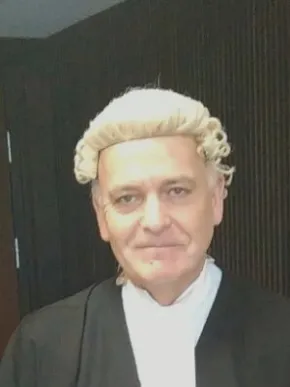To mark the launch of the book, Life Beyond Crime: What do those at risk of offending, prisoners and ex-offenders need to learn? We have conducted a series of Q&As.

Sheriff Lindsay Wood was born in Hamilton and was educated in Motherwell and Arbroath. He graduated LLB from Dundee University in 1977. He was appointed a Sheriff in Glasgow in 2003, having previously been a court solicitor for over 20 years. He was a partner and then managing partner of Thornton’s Solicitors, before he moved to the Bench. As a Sheriff in the busiest court in Europe, he deals with a wide variety of cases including civil actions, domestic abuse cases, jury trials and Fatal Accident Inquiries.
He has presided in specialist courts in Glasgow including the commercial court and the drug court which he has sat in for 14 years. His court has a constant stream of visitors including law students, academics, politicians and judges from literally all over the world. He featured in a BBC documentary "Avalanche" which provided an insight into how the criminal justice system deals with the drug problems which Scotland faces. He has spoken at drug conferences in the USA and Europe alongside former addicts Martin Sheen of the West Wing and Matthew Perry from Friends and his drug court has been favourably highlighted on BBC Newsnight. He has assisted Norway, France, Italy, England and Northern Ireland in establishing Drug Courts.
He has sat on various tribunals and charitable organisations and until recently, he was the President of the Sheriffs' Association of Scotland. He considers himself particularly fortunate to be a Sheriff in Glasgow with all the challenges it brings every single day.
What is the one thing you wish people coming to the Glasgow Drug Court for the first time all knew before they arrived?
That they will be given a unique opportunity to change their lives after years of addiction and the consequential and varied ill-effects.
You place a lot of emphasis on treating everyone you see with respect, making sure that they understand what is going on and that they have a voice. What do you think that means to offenders? Why is it different from what they see elsewhere?
As part of the rehabilitation process, the regular court reviews require to be particularly meaningful. The offender is given the opportunity to speak and to be listened to and to engage in dialogue with the bench. There is clear evidence that there can be significant therapeutic benefit to offenders who engage in constructive conversation with the bench. Psychologically, it can motivate and inspire them to do better than they thought they were capable of. If an offender is performing well, he will receive due praise and encouragement and that may well be a different dynamic from previous court experiences. Appropriate respect is afforded to the offender and invariably it is reciprocated. Such a scenario can relax the offender and allow him to be open and honest. That is a very positive step in recovery.
What is the one thing you would like every offender to learn by the time they are finished their time with you?
That they have been treated fairly and with respect and that they have been offered no better chance to rehabilitate, be drug and crime free and feel better about themselves. They will also learn that only by being open and honest can they maximise their recovery.
What is the most important thing you have learned from the offenders who come before you in the drug court?
That dealing with deep seated drug addiction is far from straightforward and a degree of understanding and flexibility is essential to facilitate change. That said, if it emerges that they are not prepared to fully commit to change and try their best, a Drug Court Order is not for them.
Life Beyond Crime
Life Beyond Crime brings together in an insightful and passionate debate, through prose, poems and pictures the assembled first-hand experience and wisdom of more than 60 contributors responding to the question What do those at risk of offending, prisoners and ex-offenders need to learn? Contributors include current and former prisoners including the work of artists and poets who have been recognised by Koestler awards; criminal justice practitioners; educators and academics; as well writers from the voluntary and arts worlds including theatre director Phyllida Lloyd, lyricist Sir Richard Stilgoe and sculptor Sir Antony Gormley. Learning and understanding are discussed in their widest sense, covering not just formal learning and learning skills, but also - and most importantly - learning about yourself, your past and future identity, your family life and your aspirations and role in society. These types of understanding are explored in the contexts of diversion from crime, young people, adults in prison, and returning to the community.
You can buy the book online from the Koestler Trust